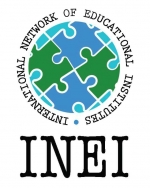History
Around the world, we all face profound and complex challenges as a result of rapid population growth, resource depletion and the movement of people and ideas across the globe on a scale and at speeds unparalleled in human history. We need to be smarter than any generation before us has been, more inventive and more open to new ideas, challenges and insights, more generous in our openness to others. Investment in education is now widely seen across the world as critical for long-term economic success and social cohesion. There is a pressing need for research-based contributions to our understanding of critical educational challenges. Until the establishment of the International Network of Educational Institutions (then IALEI) in 2007, no international organization drew together the leading institutions concerned with educational research and teacher preparation around the world.
The International Network of Educational Institutions (INEI) fills this void, and constitutes a unique reservoir of experience, insight and knowledge about long-term and underlying issues in education. IINEI’s first Memorandum of Understanding was signed by the eight founding members on 21 August 2007 in Singapore. Later, the University of Sao Paulo in Brazil and the University of Cape Town in the Republic of South Africa were added as members. In connection to the Annual International Conference in Melbourne, 21-23 August 2012, a new Memorandum of Understanding was drafted. It was signed in connection to the Annual International Conference in Beijing, October 2013. On the 2013 Annual Conference, all the members agreed to change organization’s name to International Network of Education Institutes (INEI).
In the MOU, members agreed to hold annual joint conferences in different institute in a rotation basis. Conference themes and detailed information are listed below:
2016: “Mobility, Migration and Displacement”, University of Wisconsin-Madison, USA
2015: UCL Institute of Education, University College London, United Kingdom
2014: “Teacher Education in Crisis”, University of Sao Paulo, Brazil
2013: “Access to Higher Education”, Beijing Normal University, China
2012: “Educational Disadvantage”,University of Melbourne, Australia
2011: “Knowledge Mobilisation”, University of Toronto, Canada
2010: “Multicultural Education”, Nanyang Technological University, Singapore.
2009: “Education for Sustainable Development”, Seoul National University, South Korea.
2008: “Teacher Education”, Aarhus University, Denmark
Mission Statement
It is our aim that the work of the Network makes an impact on policy decisions, influences funding and inspires research and interventions that have a meaningful impact on education locally and globally.
